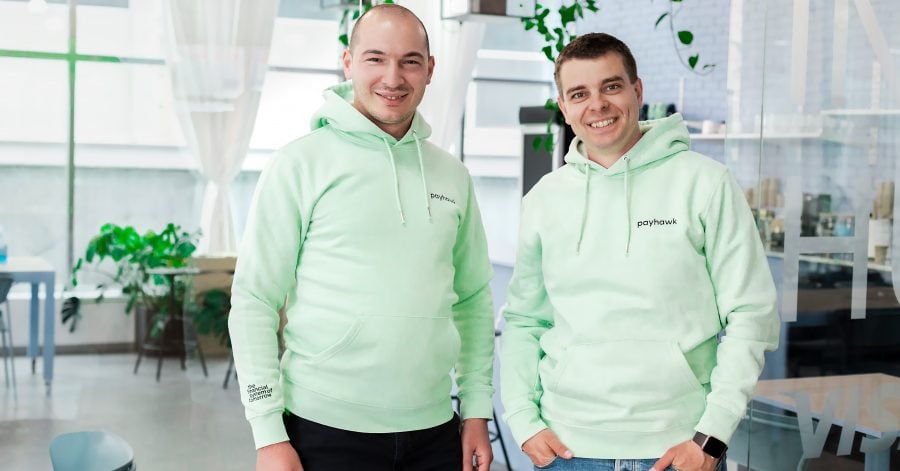What do we usually associate big corporations with? People outside such firms often think of the corporate environment as orderly structured and tightly controlled by rules, but this is not always the case with huge companies. When it comes to expense management, asserting control over big teams and departments has posed a challenge to both executives and employees, with finance leaders often preferring employees to spend personal funds and then wait for reimbursements. So, how can innovation help?
Following the news about the record-breaking $20M Series A of Bulgarian expense management startup Payhawk, The Recursive team met with Hristo Borisov, company founder and CEO, to discuss this hot topic. Filling the gap between traditional banks and accounting systems, the startup has developed company cards for employees to cover their work expenses in a way that allows for controlling budgets in real-time and fully automating payment and expense approvals regardless of the payment method.
The Recursive: How did you identify the problem you’re solving with Payhawk?
Hristo Borisov: Boyko (the other co-founder of Payhawk – Ed. Note) and I started with the idea that we want to build a big company. For this to happen, we needed a big problem in a big market. Our first idea was connected to the fact that businesses manage a large number of payments and subscriptions and probably did not have control over them.
We did a one-week-long “sprint”, during which we created a prototype for our solution in 5 days and started selling it. In the next month and a half, after conducting over 40 interviews with financial directors from all over the world, we discovered another more pressing problem related to the management of the physical company cards.
It turned out that often employees had to share a card, stored, for example, in a cupboard in the accountant’s office – whenever someone needed to buy something, they would just go and pick a card, this record would go to one place, the receipts to another. There were cases when companies with over 40 employees would have just two 2 corporate cards – every employee had a photo of the card and everyone was using them to cover their expenses, thus making the task of accountants to track down who made what expense impossible. Banks would provide businesses cards to cover spend, but expenses would exist in a separate universe.
This is when we realized that there will be consolidation in the market – it looked like it was about time expense management solutions merged with financial instruments in an integrated system, and there were already a few companies emerging in the space.
How has your positioning evolved since these first days?
Hristo Borisov: Well, people were more or less intrigued by the initial solution we had come up with – automating corporate cards, setting limits and budgets, etc. but they were also interested in finding a way to make it work with employees they did not want to give a card to. We needed a process for employees without cards that would allow them to upload their receipts so they get reimbursed by employers straight from the product.
When we came up with the first prototypes, a friend of mine described it as a combination of Revolut for Business, ReceiptBank, and Expensify, all in one. But even though all these companies provided separate solutions that could exist by themselves, the market wanted something more integrated.
For 4 months, we managed to bring our first cards to the market, and also we supported automated data extraction from documents in more than 60 languages with a self-learning model. For 12 months we managed to attract clients from 15 different countries. It was of big importance to create a software-focused strategy. We clearly started validating the need for an integrated payments stack that combines multiple disconnected systems in one product.
It’s worth mentioning that our focus is servicing mid-sized and large companies. Companies of this size already have traction and have based their business model mostly on traditional services which means they are not going to jump in to work with neobanks simply because the latter marketed themselves as a better replacement for traditional banks. Larger companies have lasting relationships with their traditional banks, and we don’t want to disrupt this. Our goal is to empower companies to manage their money and processes more efficiently so that the finance team can empower the organization to grow rapidly.
Under the hood we are a neobank – we facilitate bank and SEPA transfers, faster payments, the latest cutting edge card issuing, and process automation. However, we didn’t try telling our corporate clients to abandon the banks that have been serving them for many years. We just used the best practices introduced by the neobanking experience and introduced a lot of software tools to manage your company process in an automated and efficient manner on top of your bank account and existing ERP system.
What are the next product functionalities Payhawk will need to deliver in order to increase its market share?
Hristo Borisov: It’s very important for companies to be able to set up their own personalized process and workflows in Payhawk. Fortune 500 companies generally have very different needs from a medium-sized business. Ultimately, it’s our goal to unify the different worlds in the enterprise financial system – payment infrastructure, banking, and accounting software.
Can you tell us more about the industry trends that contributed to your super fast growth over the past 12 months?
Hristo Borisov: First, because of the pandemic, now people have to start managing bigger online budgets. One of the things we implemented are the so-called “team cards” through which all members of a particular team or department have access to a corporate card and the respective departmental budget. In its essence, the financial department is able to trace the money spent and every team member is responsible for gathering his/her own invoices and bills.
Secondly, as the fintech market is consistently growing, more and more big companies are starting to treat fintech solutions as a real opportunity for their business. The pandemic made a lot of owners think about how they can be more efficient.
Another efficiency-related topic is that many companies currently implement hiring freeze – they do not hire people but rather think about how they can utilize the skills and knowledge of their current employees more strategically, instead of using them for back-office support and invoice management.
On the other side of the spectrum, firms who grew because of the whole situation had to scale fast. Scaling when you are present in several countries is not an easy thing to do, especially when it comes to the financial departments. This enabled us to service companies with offices in more than 23 countries and would like to use a single solution for all the markets rather than 15 different ones. We are a good fit when you want to scale fast as we enable the financial department to be quite lean.
A fourth factor, connected to the remote work trend, is giving your employees more and more freedom and autonomy, which makes accessing corporate budget cards very important as employees feel a more integrated part of their company when they have the opportunity to manage their budgets. Compared to having to go through hell to spend 20 euros.
What are the next three big milestones for Payhawk?
Hristo Borisov: We have to establish Payhawk as a trusted and recognized brand among CFOs. We have to cut through the noise and make people aware that we are part of the new financial wave in the market. Another milestone is to expand the team and establish a scalable organization with high talent density. Thirdly, we would like to create an enterprise product, which has a global footprint – currently, we have clients from 23 different countries, so we’d be aiming to support a bigger number by the end of the year.
If we managed to accomplish these three targets, we are sure – growth will follow.
Moving forward, what will be the main challenges in the company’s growth journey?
Hristo Borisov: Finding the right people will likely be the biggest challenge for us in our scaling process. We are not particularly worried about the software, the product, or the market. When you’ve seen that you have product-market fit, the biggest challenge is execution, and execution comes from people.
Sofia will always continue to be our product and business strategy headquarters. All of our engineers, product managers, and UX people are here. Our customers are in Berlin, Barcelona, London, etc., so these are the places where we would like to develop our marketing and sales divisions.
If you can give one piece of advice to young entrepreneurs in Southeast Europe, what would it be?
Hristo Borisov: My advice for founders is to never stop trying and not to get discouraged if something does not work well in the beginning. Perseverance is the most important factor, next to rooting for yourself and taking risks. We have an internal saying: “When in doubt, risk it.” It is very important that you think about both the big vision and the practical steps to validate that this vision is feasible. At Payhawk, we made 20+ iterations of the business plan and model before we got our first customer.
Another important thing for founders from Southeast Europe (SEE) is thinking strategically – you should be able to explain where you are now and where you want to be in 5 years – these are the most important criteria Western investors are looking for. It is very important to think not only about the big vision but also about the practical steps towards scaling. Companies in the region also need to think more bravely. There is still the tendency to be afraid of thinking like a visionary and looking at global markets.
I believe that the region will become a hotspot for international investors in the next few years. A very strong advantage of local companies is that they have to be international from day 1. And also there are great examples of regional investors like Earlybird, Eleven, Launchub, VentureFriends and many others. Make sure you talk to investors early and often.
More and more people should try building companies, be part of the ecosystem and share knowledge – the moment we reach 2-3-4 successful companies, the carousel starts turning – Telerik was the first positive example of how a single success story can influence the entire ecosystem – many high-growth Bulgarian startups such as Gtmhub, OfficeRnD, SmsBump and Payhawk were all started by former Telerik employees.








